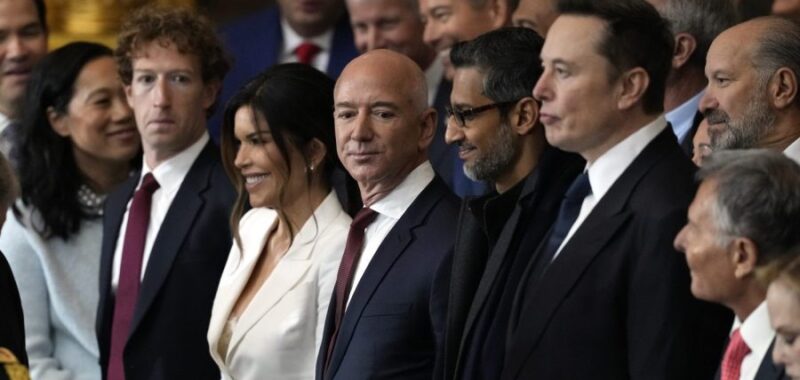
It was impossible to watch President Trump’s second inauguration this week without noticing Silicon Valley’s “oligarchs” — Elon Musk, Mark Zuckerberg, Jeff Bezos, Peter Thiel (who didn’t attend the inaugural but threw an inauguration party) and their ilk — lining up to curry favor.
Once upon a time, the ultimate aspiration of the ultra-wealthy was to accumulate enough “F-you money” to operate above societal constraints. Now, the tech titans appear so entangled with federal power and have so much at stake financially that they seem compelled to kiss the ring.
This dynamic could be interpreted two ways. One view is that these tech magnates are simply capitulating, hedging their bets in a political environment where noncompliance could be costly (see Trump’s previous threat to jail Zuckerberg). Another is that they’re playing a long game, using Trump as a tool — a convenient vessel to advance their goals in the political realm.
But what do these tech bros actually want?
Like most corporatist elites, they favor lower taxes, deregulation and access to cheap labor, as evidenced by recent clashes with the populist right over H-1B visas.
Still, for some in the tech world, the rightward shift was personal. Take Marc Andreessen, a prominent tech investor, who recently voiced his disillusionment with what he saw as the broken social contract of the Obama era. “The deal is that you could be a successful businessperson, celebrated for your innovation and wealth, and then, at the end, you give it all away and are celebrated again,” he said. “That washes away your sins.”
Andreessen feels double-crossed, as though his philanthropy and political donations failed to secure the immunity and adulation he expected from progressives.
These motives — greed, fear, ego and revenge — are easy to understand. But their implications grow more unsettling when we consider the unique ambitions that these tech billionaires also harbor. Their goals, which are rooted in blockchain, artificial intelligence and transhumanism, transcend Trump and could outlast the American experiment as we know it.
Jonathan Taplin, director emeritus of the Annenberg Innovation Lab, captures this vision in his 2023 book “The End of Reality: How Four Billionaires Are Selling a Fantasy Future of the Metaverse, Mars, and Crypto.” Taplin outlines their dreams: Zuckerberg’s metaverse, the notion that people might spend something like seven hours a day wearing a virtual reality headset; Musk’s colonization of Mars; untraceable crypto wealth, which exists beyond the control of the state; and Thiel’s quest to reverse aging (or at least live to be 160).
The consequences of these ambitions could be profound. And while there’s not enough room here to unpack all of the potential implications, Taplin argues that they undermine foundational democratic principles, such as Thomas Jefferson’s ideal that “all men are created equal.”
In a world of transhumanism, where wealth determines lifespan and genetic advantages, equality could become meaningless.
We stand at a pivotal moment, grappling with profound questions about the future of liberal democracy, the essence of humanity and the transformative impact of rapid technological advancements like AI. Yet we are entrusting the very individuals with the most significant vested interests in these outcomes to act as the arbiters and expert rule-makers shaping this future.
It won’t be easy, but combating this dystopian future might involve teaming up with some strange bedfellows from the populist right. In a recent interview with a columnist from the New York Times, Steve Bannon railed against “technofeudalism” and “transhumanism.” Bannon warned that “Everybody’s scared because of their power.” Bannon may be wrong about a lot of things, but this is not one of them.
Taplin, who has also enjoyed success in music and film, suggests that in a virtuous society, it is “the humanists — the writers, musicians, filmmakers, and artists — [who] have to provide a vision for where we want to go.”
Yet the 2024 elections revealed a cultural shift: Artistic influencers (like Taylor Swift, who endorsed Kamala Harris) seem to have lost much of their ability to shape public opinion — at least when it comes to how people vote.
In their place, it’s the tech titans — many of whom weren’t even born in America — who increasingly dominate this country’s cultural and political discourse.
These are no longer the stereotypical nerds of yesteryear. Today’s tech bros flaunt gold chains, beautiful wives and girlfriends and gym-sculpted physiques. This is “Revenge of the Nerds” but on steroids.
The geeks have inherited the earth, and we can only hope they don’t burn it to the ground.
Matt K. Lewis is a columnist, podcaster and author of the books “Too Dumb to Fail” and “Filthy Rich Politicians.”

